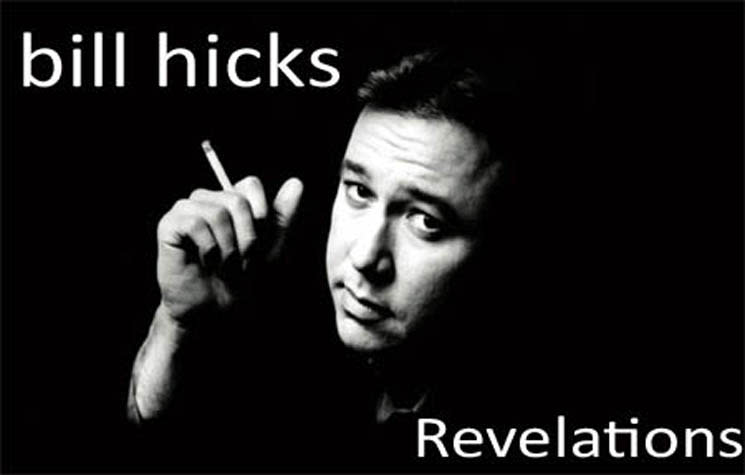I don't believe it was random chance that Netflix added Sam Kinison's 1991 special Family Entertainment Hour on the same day that they added Bill Hicks' 1993 special Revelations. It would be remiss to place the work of Hicks in a historical context without mentioning Kinison. Although Kinison was about eight years his senior, Bill and Sam were two sides of the same coin, contemporaries as members of the influential Texas Outlaw Comics troupe in the mid-'80s, who both tragically passed away in their 30s just when it seemed they were on the precipice of infamy.
Kinison was a big influence on Hicks. Seeing how freely Kinison vented onstage helped Hicks push past his Woody Allen roots to find the courage not to ask the audience to like him, or even prefer that, as it has been said that Hicks tended to perform better in front of less hospitable crowds. As they worked through their careers, Kinison flirted with mainstream success while Hicks was far better received by UK audiences, yet their divergent streams still crossed over between Family Entertainment Hour and Revelations, the two sets that show them at the height of their powers. They attacked much of the same subject matter, but their approaches were drastically different.
Often expressed through a scream of emasculation, Kinison drew his rage from two failed marriages, while Hicks tapped something deeper, drawing on the Kennedy assassination and insights discovered through psychedelics and meditation. Kinison was a slightly more evolved Andrew "Dice" Clay, saying whatever sexist, homophobic and/or racist thing popped into his head while surrounded by babes in bondage gear. Hicks could be just as offensive in his comedy, and occasionally was, but he used comedy to deliver a philosophy, a way of looking at the world. He took apart the issues of the day with the precision of a young Jon Stewart or John Oliver.
There is a reason why Bill Hicks became so much more popular after his death, while you don't see very many Sam Kinison references anymore. Hicks picked more accurate targets, so his references have held up years longer than they should have, which is a testament to his foresight as well as the stagnation of the American dream.
Granted, the editing on Revelations is a little choppy, the superimpositions a little heavy, and Hicks was performing at the Dominion Theatre in London, where he was highly respected in his day. Hicks delivered much of the material from this special better elsewhere, yet, there is a kind of magic in seeing Hicks perform it, how physically invested he'd get into painting his graphic and/or perverse scenes. Hicks committed to his stories, even if they made him appear foolish.
Hicks closes Revelations with his much sampled positive news story about acid, followed by one of the most profound statements anyone ever said about life, summarised by the often repeated phrase "It's just a ride." Decades later, the last five minutes are still as relevant and revolutionary as they ever were. After all these years, he still has much to teach us.
Exclaim! is reviewing every standup comedy special currently available on Netflix Canada, including this one. You can find a complete list of reviews so far here.
Kinison was a big influence on Hicks. Seeing how freely Kinison vented onstage helped Hicks push past his Woody Allen roots to find the courage not to ask the audience to like him, or even prefer that, as it has been said that Hicks tended to perform better in front of less hospitable crowds. As they worked through their careers, Kinison flirted with mainstream success while Hicks was far better received by UK audiences, yet their divergent streams still crossed over between Family Entertainment Hour and Revelations, the two sets that show them at the height of their powers. They attacked much of the same subject matter, but their approaches were drastically different.
Often expressed through a scream of emasculation, Kinison drew his rage from two failed marriages, while Hicks tapped something deeper, drawing on the Kennedy assassination and insights discovered through psychedelics and meditation. Kinison was a slightly more evolved Andrew "Dice" Clay, saying whatever sexist, homophobic and/or racist thing popped into his head while surrounded by babes in bondage gear. Hicks could be just as offensive in his comedy, and occasionally was, but he used comedy to deliver a philosophy, a way of looking at the world. He took apart the issues of the day with the precision of a young Jon Stewart or John Oliver.
There is a reason why Bill Hicks became so much more popular after his death, while you don't see very many Sam Kinison references anymore. Hicks picked more accurate targets, so his references have held up years longer than they should have, which is a testament to his foresight as well as the stagnation of the American dream.
Granted, the editing on Revelations is a little choppy, the superimpositions a little heavy, and Hicks was performing at the Dominion Theatre in London, where he was highly respected in his day. Hicks delivered much of the material from this special better elsewhere, yet, there is a kind of magic in seeing Hicks perform it, how physically invested he'd get into painting his graphic and/or perverse scenes. Hicks committed to his stories, even if they made him appear foolish.
Hicks closes Revelations with his much sampled positive news story about acid, followed by one of the most profound statements anyone ever said about life, summarised by the often repeated phrase "It's just a ride." Decades later, the last five minutes are still as relevant and revolutionary as they ever were. After all these years, he still has much to teach us.
Exclaim! is reviewing every standup comedy special currently available on Netflix Canada, including this one. You can find a complete list of reviews so far here.
